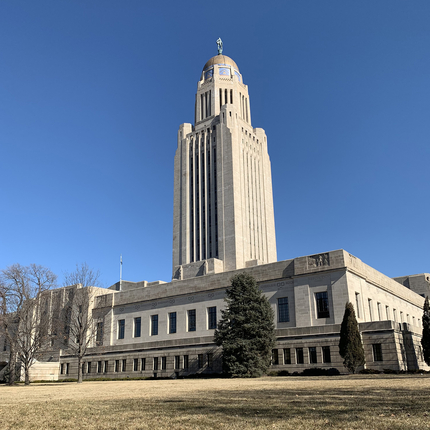By Tim Mussack, former staff member
Below is our agenda for the 2022 Nebraska legislative session. These are items we believe will be debated during the session and for which we have been preparing. As happens every year, there will be bills introduced and issues that arise that we do not know about at this time. We reserve the right to engage as necessary.
Relevant developments concerning priority legislation will be shared via the Center for Rural Affairs legislative updates throughout the sessions.
What do you think?
Let us know your input on these priorities and tell us about other state issues that are important to you. Are you interested in writing a letter to your legislator or even testifying at the state capitol?
Let us know.
Contact me at [email protected] or 402.687.2100 ext. 1032.
Visit cfra.org/signup or email [email protected] for updates.
Appropriations
Summary – Our work during the 2021 legislative session led to the passage of Legislative Bill (LB) 324. This created the Independent Processor Assistance Program (IPAP), which was designed to expand the capacity of the state’s smallest meat lockers. The bill also made it easier for consumers to purchase meat directly from producers. With this foundation in place, we turn our focus to implementation.
Our position – Our primary objective is to obtain adequate funding for IPAP. According to the guidance made publicly available, we believe this program will meet the eligibility requirements necessary to receive funding through the State Recovery Fund of the American Rescue Plan Act of 2021. We will lead the effort to secure this allocation.
Budget and tax
Summary – As many predicted, enactment of LB 1107 did not assuage concerns regarding property tax and school funding. There is near-universal consensus that comprehensive tax reform is needed. Blueprint Nebraska will present one such plan. After working with members of the Revenue Committee and other key stakeholders over the interim, we anticipate their proposal will drive much of the tax discussion this session.
Our position – We agree that Nebraska’s tax code is in need of significant reform. However, the details matter. Any proposed adjustment to property, income, or sales tax must ensure that rural schools and other essential services are properly funded.
Economic development
Summary – Our work during the 2020 and 2021 legislative sessions helped solidify funding for Business Innovation Act (BIA) programs. Allocations to the Microenterprise Assistance Program, a BIA initiative focused on the state’s small businesses, have increased to $1 million annually. This funding is an important part of Center for Rural Affairs programming, as it allows staff to provide loans and technical assistance to rural entrepreneurs across Nebraska.
Our position – Current statute limits the size of loans made with Microenterprise Assistance Program funding to $100,000 or less. Last updated in 2015, this limitation often requires lending organizations to find secondary sources of funding to complete business loans. We will initiate legislation to raise this cap.
Energy and environment
Summary – Every session, the Legislature considers one or more proposals to limit renewable energy in the state. The 2022 session will be no different. LB 409, introduced in 2021, remains in the Executive Committee. This bill to place a moratorium on construction on transmission lines was chosen as one senator’s priority bill last session.
Our position – We support policy that expands economic opportunity for communities through clean energy development. We are again prepared to defend against efforts to limit future renewable development in Nebraska through unworkable siting standards. We are also committed to advocating in support of action to address climate change.
Family economic security
Summary – The COVID-19 pandemic brought attention to the shortage of health care workers across rural Nebraska. Advocates are exploring opportunities to use funding made available through the American Rescue Plan Act of 2021 to help close this gap. Suggestions include developing a new rural health care workforce training program and expanding eligibility for student loan repayment programs to advanced practice nurses.
Our position – The Center is dedicated to ensuring rural families have access to the essential goods and services they require. We will advocate for policies that will help expand the health care workforce in rural Nebraska. We will also look for ways to help struggling rural families get back on their feet and to ensure they have the support to do so in uncertain times.
Food and agriculture
Summary – Mobile and home-based food businesses continue to grow in number. Many are owned and operated by first- or second-generation Nebraskans. Like many states, Nebraska regulates these new enterprises by relying on a food code written for brick-and-mortar restaurants. Municipalities and health districts have created a hodgepodge of standards to fill the gap. We are now learning how ineffective this can be.
Our position – We will support legislation to standardize the permitting process for mobile and home-based businesses. We will also explore updating the Nebraska Food Code to provide regulatory certainty. This issue is new to many legislators, and any change will require a significant investment in education.





